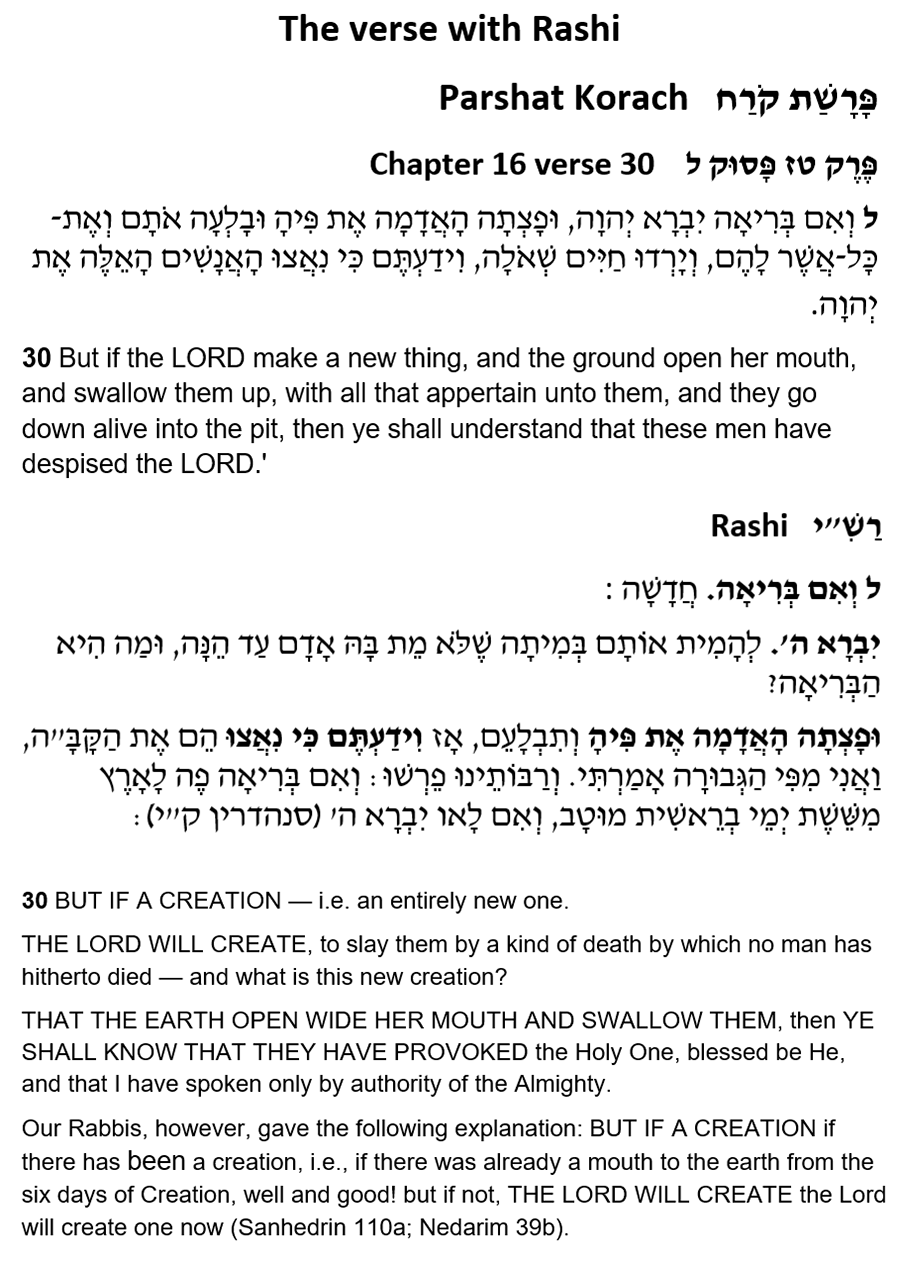Weekly Portion - Korach
By Rabbi Boruch Rappaport

Questions:
1) What is the meaning of “b’riya” (creation) in the verse according to Rashi?
2) This Rashi is quite wordy, almost seems like he’s trying to bring out other points. What lies behind his words?
Answers:
Today’s Mizrachi discusses our Rashi almost word for word.
He writes that Rashi, even though the text reads smoothly and it doesn’t seem that he is saying anything particularly deep, he is actually reconciling several problems with his words:
1) First Rashi explains that the word “b’riya” which is used in our verse, is not used in the same sense that normally “b’riya” is used. Normally it is used to designate something that was created which didn’t exist before. Here you can’t learn that way, first of all because the verse says in Kohelet (Ecclesiastes), “There is nothing new under the sun”. And furthermore, nothing was actually created over here.
Rather the creation was the action that G-d killed these wicked people in a new way that had never happened until then.
This is why Rashi added after “BUT IF A CREATION” the explanation “an entirely new one”, in order to emphasize how you can’t learn, (because of the two reasons mentioned above), and so it must be that the “creation” is going on the action.
2) Then Rashi said, “and what is this new creation? THAT THE EARTH OPEN WIDE…” in order to explain that you shouldn’t read that the new creation was one thing and that the earth opening up its mouth was a different thing. Rather it is as if it said, “But if the LORD make a new thing, THAT the ground open her mouth”.
3) Afterwards Rashi quoted in context the part of the verse, “Veeydatem”, and not just “az taid’u” in order to bring out that the vav of Veeydatem is both a “vav hahipuch”, a vav whose function is to change the past tense to future tense, and also a “vav hachibur”, a vav which is used to connect with the above, that the “then you will know”, is the conclusion of “if G-d creates a new creation”.
4) Also Rashi added the words, “and that I have spoken only by authority of the Almighty”, because in the first half of Moshe’s declaration (in the previous verses), he said that if these people die like all people die, then “G-d did not send me”. It would have been expected that when Moshe said the other side of the coin that he would say that G-d DID send me. Learns the Mizrachi that Rashi means to explain that included in the words “then YE SHALL KNOW THAT THEY HAVE PROVOKED”, is that Moshe spoke from the mouth of the Almighty.
5) And since the words “then YE SHALL KNOW…” and the words “and that I have spoken only by authority of the Almighty” relate to two different subjects, therefore Rashi felt the need to add the word, “VeAni”, and I. As if to express, “and as for me, I spoke with the authority of G-d”.
-------------
This lesson is spoken out much more in the video presentation than it is here on the written page. This is not because I purposely hold back content from the non-upgraded members. But rather because there is an intrinsic difference between the medium of the written word as opposed to the vocal audio. When speaking, more points are able to be related to, more points are able to be clarified than in the medium of writing.
In addition I usually give an introduction to the lesson by showing the verses before and after to show how our posuk (verse) fits into context. This I don’t do here on the page because of time constraints.
Please see the sources from the links at the bottom of the page.

